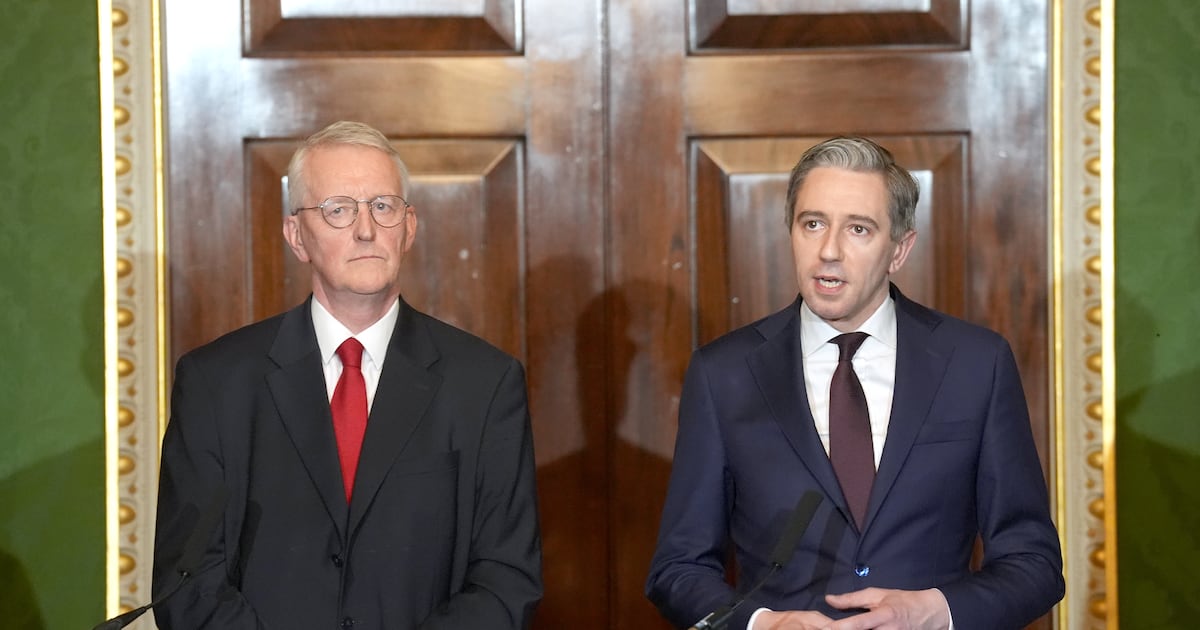A long-awaited joint framework to address the legacy of the Troubles will provide “sweeping reforms” that offer routes to “truth and accountability”, the Tánaiste has said at its unveiling on Friday.
Simon Harris and Northern Secretary Hilary Benn jointly announced details of the framework, which replaces the UK government’s controversial Legacy Act, at a press conference in Hillsborough Castle in Co Down on Friday afternoon.
The Legacy of the Troubles: A Joint Framework is the conclusion of months of intensive engagement between the Irish and UK governments.
Mr Harris hailed the new deal as a “step change” from the previous Legacy Act, which was implemented under the former UK Conservative government – and led to an interstate case being brought by the Irish Government against London.
[ Legacy body must have power to recommend Troubles prosecutions, says Hilary BennOpens in new window ]
Mr Benn said it replaced “the previous [UK] government’s flawed, undeliverable and widely opposed Legacy Act” which had caused “great pain and anguish to many people in Northern Ireland”.
“I believe that this framework, underpinned by new co-operation from both our governments, represents the best way forward to finally make progress on the unfinished business of the Good Friday Agreement”, and this would allow bereaved families “to find the answers they have long been seeking”.
The new proposals include a new dedicated Legacy Unit being set up within An Garda Síochána, which will investigate all unresolved Troubles-related incidents in Ireland, and a €25 million support fund for victims.
The joint framework is broadly similar to the deal at Stormont House, which was agreed in 2014 but never implemented.
It envisages two separate bodies: one for information recovery, and another, a new Legacy Commission, to replace the current Independent Commission for Reconciliation and Information Recovery.
Inquests halted by the Legacy Act will resume and the ban on Troubles-related civil cases will also be lifted.
A Victims and Survivors Advisory Group and an independent appointments panel advising on senior appointments will also be created.
The Legacy Commission will carry out investigations capable of leading to prosecution, while the establishment of a judge-led inquisitorial mechanism will include public hearings and effective next-of-kin participation.
Taoiseach Micheál Martin said the framework is fundamentally ‘about many, many families getting closure’. Photograph: Sam Boal/Collins Photos
Both governments will commit to reciprocal co-operation with legacy investigations, and legislation will be enacted in each jurisdiction to fulfil the requirements of the framework.
The UK government also stressed “six new protections for and rights” for veterans in the framework, and said they would “ensure no veteran who carried out their duty properly will be forced to face endless legal uncertainty.”
Mr Harris hailed the deal as one that will bring “root-and-branch reform” to the previous legislation and the commission it created.
The joint framework will provide “routes to truth and accountability for those most affected by the violence of the Troubles”, he said.
It will also provide for “sweeping reforms of the mechanisms designed to address the legacy of the Troubles in Northern Ireland, and across this island” as well as routes “to truth and accountability for those most affected by the violence of the Troubles”.
Victims’ representatives were briefed on the framework this morning ahead of its publication, and the Tánaiste also spoke by phone to Bridie Brown, the widow of murdered GAA official Sean Brown.
Mr Harris acknowledged that winning the confidence of families “will take time”.
The new deal is seen as a reset in relations between the two governments following a bitter rift over the Legacy Act.
At the outset of negotiations, the Irish Government asked that any agreed approach to legacy would need to meet two tests: being compliant with the European Convention on Human Rights, and being capable of securing the support of those most affected, “especially the families of those killed”.
Mr Harris said that the framework, “if fully implemented”, will deliver on these two goals, a move that could potentially pave the way for the withdrawal of Dublin’s interstate case.
Speaking in Waterford on Friday, Taoiseach Micheál Martin said the framework is fundamentally “about many, many families getting closure in respect of the murder of their loved ones and the killing of their loved ones. We have had a very good engagement with UK prime minister Keir Starmer’s government”.
“No agreement is perfect but in our view this represents a very significant opportunity now to have agreement with the British government and to work with families of victims in the time ahead.”

